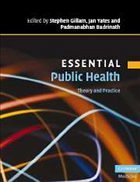A textbook covering the essentials of public health in theory and practice.
How can society most effectively prevent disease and promote health? This is the challenge addressed by this textbook. Public health has been defined as the art and science of preventing disease, prolonging life and promoting health through the organised efforts of society. The 'science' is concerned with making a diagnosis of a population's health problems, establishing their cause, and determining effective interventions. The 'art' is to address these problems creatively. The aim of this book is to capture both the art and the science of the field. Essential Public Health is divided into two major sections. The first part provides a toolkit of skills the practitioner must acquire, and the second half describes the global challenges faced, and how to go about the task. This will be essential reading for all public health trainees and health professionals, and includes a CD containing interactive, self-assessment questions and exercises to test understanding.
Table of contents:
Forewords: Tony Jewell, CMO Wales; Professor John Danesh; Introduction; Part I. The Public Health Toolkit: 1. Demography; 2. Epidemiology; 3. Evidence-based health care; 4. Improving population health; 5. Screening; 6. Health needs assessment; 7. The health status of the population; 8. Health care evaluation; 9. Decision-making in health care; 10. Health protection and communicable disease control; Part II. The Challenges of Public Health in Practice: 11. The health of children and young people Rachel Crowther and Sarah Stuart-Brown; 12. Adult public health Veena Rodrigues; 13. Public health and aging Carol Brayne and Lincoln Sergeant; 14. Tackling health inequalities Chrissie Pickin; 15. Health policy Richard Lewis; 16. Quality measurement and improvement in health care Nick Steel; 17. International development and public health Jenny Amery; Conclusion: Public health - the future - be part of it David Pencheon.
How can society most effectively prevent disease and promote health? This is the challenge addressed by this textbook. Public health has been defined as the art and science of preventing disease, prolonging life and promoting health through the organised efforts of society. The 'science' is concerned with making a diagnosis of a population's health problems, establishing their cause, and determining effective interventions. The 'art' is to address these problems creatively. The aim of this book is to capture both the art and the science of the field. Essential Public Health is divided into two major sections. The first part provides a toolkit of skills the practitioner must acquire, and the second half describes the global challenges faced, and how to go about the task. This will be essential reading for all public health trainees and health professionals, and includes a CD containing interactive, self-assessment questions and exercises to test understanding.
Table of contents:
Forewords: Tony Jewell, CMO Wales; Professor John Danesh; Introduction; Part I. The Public Health Toolkit: 1. Demography; 2. Epidemiology; 3. Evidence-based health care; 4. Improving population health; 5. Screening; 6. Health needs assessment; 7. The health status of the population; 8. Health care evaluation; 9. Decision-making in health care; 10. Health protection and communicable disease control; Part II. The Challenges of Public Health in Practice: 11. The health of children and young people Rachel Crowther and Sarah Stuart-Brown; 12. Adult public health Veena Rodrigues; 13. Public health and aging Carol Brayne and Lincoln Sergeant; 14. Tackling health inequalities Chrissie Pickin; 15. Health policy Richard Lewis; 16. Quality measurement and improvement in health care Nick Steel; 17. International development and public health Jenny Amery; Conclusion: Public health - the future - be part of it David Pencheon.

